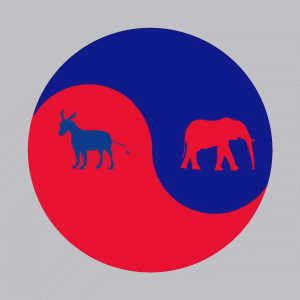
Courtesy of aspanational.wordpress.com
There’s something terribly wrong with our political system when Senator Jim DeMint of South Carolina, a conservative Republican with no postgraduate experience in economics or political science, resigns from the most powerful legislative body on earth to become the president of The Heritage Foundation.
The Heritage Foundation, estabished to “formulate and promote conservative public policies based on the principles of free enterprise, limited government, individual freedom, traditional American values and a strong national defense,” is considered one of the most influential research organizations in the country. Keep in mind that in Washington, the word “influential” has nothing to do with academic integrity. Instead, ideological think tanks are heralded for their political power, such that a sitting U.S. senator views one of their job opportunities as a promotion. Liberal groups, such as the Center for American Progress, are just as guilty of ideological pigeon-holing. These groups aid in the development of two separate worlds, each with different parties, media and facts, making fair political debate particularly difficult. Truth takes a back burner to politics.
Should we really expect anything better from our brainiac groups in Washington? Not a chance. This fact problem in Washington can be found right in the mission statements of these pseudo-intellectual organizations; their pursuit of sound public policy is actually prefaced by a particular ideology. Go ahead and read their mission statement in the second paragraph again. I’ll wait for you. Ready?
Are you joking, Heritage Foundation? Did the Enlightenment happen? The Scientific Revolution, you know, of the seventeenth century? As Americans, we cherish our beliefs, but in the pursuit of science, we admit that those beliefs cannot act as logical premises. Heritage and other research organizations posit that ideology alone can justify policies; that they aren’t concerned with what we prove to be the best, but only what we hope to be the best. This can lead to pretty shady policy outcomes. What if I told you that mushrooms were healthy for you because they are mushrooms? Well, that’s not exactly true. Certain mushrooms are healthy to eat because it has been proven to be the case by scientists and nutritionists. On the contrary, some mushrooms are poisonous, so you probably shouldn’t eat mushrooms indiscriminately. See what I mean?
In Washington, however, both parties are so busy selling you their view of the world that they’ll also sell you a few poisonous mushrooms along the way. Conservatives have legitimate reasons to advocate for a more hospitable business environment but struggle to justify why our money is better spent lowering marginal tax rates than on crucial national infrastructure. Liberals can point to plenty of academic support for deficit spending during recessions, but experts agree that unless we adequately modify Medicare and Social Security, the programs will have catastrophic effects on our national debt over the coming decades. Democrats and Republicans tell half-truths, consulting expert testimony for some issues but shushing those same experts by the second item of their platform. They are stuck trying to address each detail of our complicated world with broad, immutable ideology.
Fortunately, there is much more consensus among academics than these two worlds suggest. In fact, most economists agree about the ways to solve our recession and the related fiscal straits. The IGM Economic Experts Panel at the University of Chicago Booth School of Business is comprised of world renowned economists who each respond to politically controversial questions concerning American public policy. Remarkably, most of their responses are nearly unanimous, aligning sometimes with Republican policy or Democratic policy, but oftentimes, with neither.
Yet here we are, forced to choose between two ideologies, two disparate worlds that rely on two disparate sets of facts. The reasoned voter, who cares about finding the best answer to our questions, is forced to determine the lesser of two jaded markets for truth. These two markets present problems for our politics. Americans think we are more divided than we actually are. Our politicians disagree far more frequently than we need to disagree. Gridlock ensues. Even more disturbing is that social science becomes politicized, and the public is fooled into thinking that truth is a two party system.
Now is the time to trust the mainstream experts because we haven’t trusted them for years. We give tax breaks to oil companies, but nearly every one of the world’s top economists surveyed thinks we should tax carbon emissions by the ton. The entire 2012 presidential campaign sang praises of small businesses as the silver bullet to stop the recession, but the economists see no reason for any distinction by firm size whatsoever. We have a lot of the answers, but our political establishments consistently choose to make truth a secondary priority. Instead, our most ideologic figures are recluses within their own realms of truth, regarding belief as logical premise and rejecting evidence that suggests otherwise.
Stark is a member of the Class of 2016.


